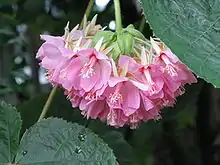Dombeya wallichii
Dombeya wallichii is a flowering shrub of the family Malvaceae known by the common names pinkball, pink ball tree, and tropical hydrangea.[2]
| Dombeya wallichii | |
|---|---|
 | |
| Inflorescence | |
| Scientific classification | |
| Kingdom: | Plantae |
| Clade: | Tracheophytes |
| Clade: | Angiosperms |
| Clade: | Eudicots |
| Clade: | Rosids |
| Order: | Malvales |
| Family: | Malvaceae |
| Genus: | Dombeya |
| Species: | D. wallichii |
| Binomial name | |
| Dombeya wallichii | |
| Synonyms[1] | |
| |
Description
The plant can grow 20[3] to 30[2] feet tall and has a spread of up to 25 feet. The alternately arranged leaves are heart-shaped with serrated edges. The hanging flower clusters are pink, showy,[3] and fragrant.[2]
Range and habitat
It is native to eastern Madagascar.[1] Its natural distribution isn't well understood, but wild specimens were collected from two coastal streamside locations on the eastern coast of Madagascar – at Antalaha on the northeastern coast, and at Mandena on the southeastern coast.[4]
It has been introduced by humans to Cuba, the Dominican Republic, Marianas, Mauritius, southwestern Mexico, Réunion, Thailand, and the Windward Islands, where it has naturalized.[1]
Cultivation
Dombeya wallichii is grown widely as a garden plant.
This species can be crossed with Dombeya burgessiae to produce the hybrid Dombeya × cayeuxii.[2]
References
- Dombeya wallichii (Lindl.) Benth. ex Baill. Plants of the World Online, Kew Science. Accessed 26 June 2023.
- Carter, K. Tropical Hydrangea: Dombeya wallichi. Center for Landscape and Urban Horticulture. University of California Cooperative Extension, Central Coast & South Region.
- Gilman, E. F. and D. G. Watson. Dombeya wallichii: Pinkball. Document ENH391. Environmental Horticulture, Florida Cooperative Extension Service, Institute of Food and Agricultural Sciences, University of Florida. Published 1993. Revised 2006.
- Skema, C. (2014). Reevaluation of Species Delimitations in Dombeya Section Hilsenbergia (Dombeyaceae). Systematic Botany, 39(2), 541–562. http://www.jstor.org/stable/24546163